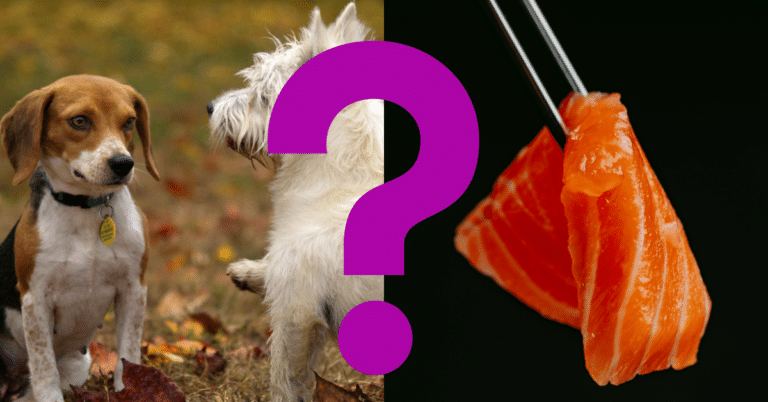Can Dogs Eat Anchovies? A Vet’s Opinion

Anchovies are small, oily fishes but can dogs eat anchovies?
Anchovies are safe for dogs to consume in moderation, but there are a few factors to consider before adding them to your dog’s diet. As a tiny, oily fish with a high protein and omega-3 fatty acid content, anchovies can offer some nutritional advantages to dogs.
Let’s dive in:
Benefits of anchovies for dogs
When given to dogs in moderation, anchovies can offer a variety of nutritional advantages. Here are a few potential advantages:
- High-Quality Protein: Dogs need high-quality protein for tissue growth, maintenance, and repair. Anchovies are a superb source of this nutrient. Protein aids in the growth of muscles and proper bodily operation.
- Omega-3 Fatty Acids: EPA (eicosapentaenoic acid) and DHA (docosahexaenoic acid) are two of the omega-3 fatty acids that are abundant in anchovies. These fatty acids help dogs maintain healthy skin, and a lustrous coat, and foster cognitive wellness since they contain anti-inflammatory qualities.
- Anchovies are tiny, but they are nutrition dense, including vitamins like vitamin D and vitamin B12, as well as minerals like calcium, iron, and selenium. These vitamins and minerals support general health and well-being.
- Joint Health: Omega-3 fatty acids, which are included in anchovies, might help reduce joint inflammation, which may be advantageous for dogs that suffer from arthritis or other joint-related conditions.
- Cardiovascular Health: By regulating blood pressure, lowering cholesterol levels, and enhancing blood flow, the omega-3 fatty acids in anchovies may enhance cardiovascular health.
- Support For Skin And Coat: Anchovies include omega-3 fatty acids, which can reduce skin irritants and encourage a healthy, glossy coat. For dogs with skin allergies or dry, itchy skin, this may be very helpful.
Although anchovies can provide these advantages, it is important to keep in mind that they should not be used as a main source of nourishment but rather as an occasional treat. As some dogs may have allergies or sensitivities to fish, not all dogs may react to anchovies in the same manner, so it’s important to introduce them gradually and watch your dog carefully for any negative responses. Before making any nutritional modifications for your dog, it is always advisable to speak with your veterinarian. Based on the specific requirements and health condition of your dog, they may assist you in determining the right amount size, and frequency.

How to safely give anchovies to dogs
It’s crucial to feed anchovies to dogs in a safe manner to guarantee that they receive nutritional advantages without any hazards. Here are some recommendations for giving anchovies to your dog safely:
- Choose anchovies that are plain, fresh, or frozen and don’t have any salt or spices added. Avoid canned anchovies because they are frequently packaged in salt or brine, which can be toxic to dogs.
- Remove Bones: Be sure to thoroughly inspect anchovies for any large or sharp bones and remove them before giving them to your dog. Although dogs may normally safely eat the little bones in anchovies, it is still a good idea to remove any potential risks.
- Both cooked and raw anchovies are OK to give to your dog. While some canines could like the flavor of raw fish, others might prefer the flavor of cooked or simply grilled anchovies. Fish bones can become softer and safer to consume by breaking down during cooking.
- Limit your dog’s intake of anchovies; they should only be offered as a special treat occasionally. Larger dogs may be given a few more anchovies as a treat than small dogs, but moderation is crucial to prevent any stomach problems.
- Introduce slowly to evaluate your dog’s reaction and any potential allergies if they have never had anchovies before. Start with a little amount and watch for any negative side effects, such as swelling, itching, or digestive issues.
- Mix With Dog Food: You may add tiny amounts of anchovies to your dog’s normal dog food to add them to their diet. By doing this, they can benefit from the nutrients without swallowing a lot of anchovies at once.
- Avoid Seasoning And Sauces: When giving anchovies to your dog, do not add any seasonings, spices, or sauces. Maintain the fish in its natural state, without any potentially dangerous additions.
- Seek Advice From Your Veterinarian: It’s a good idea to speak with your veterinarian before adding any new food, including anchovies, to your dog’s diet. Considering your dog’s health, nutritional requirements, and any other special circumstances, they may offer tailored guidance.
You may safely give your dog an occasional treat of anchovies while preserving their health and wellbeing according to these instructions.
Will anchovies make a dog sick?
Anchovies are typically safe to eat in moderation and are not hazardous to dogs when eaten in small amounts. Anchovies can make some dogs ill, but like with any new meal, certain dogs may have unique sensitivities or allergies to them. Typical signs of an allergic response to anchovies include:
- Vomiting
- Diarrhea
- Continent pain
- Skin irritation or itching
- swelling (particularly in the facial area)
- breathing difficulties or wheezing (in extreme situations)
The first time you add anchovies to your dog’s food, it’s crucial to do it gradually and in moderate doses. Keep an eye out for any indications of digestion or unpleasant reactions. It is advised to stop feeding anchovies to your dog and seek medical advice if they exhibit any of the symptoms listed above.
Anchovies packed in salt or brine can also be unhealthy for dogs because of the high sodium level, which can cause dehydration or other health problems. Always select plain, fresh, or frozen anchovies that haven’t had any flavor or salt added.
As with any dietary change, it’s crucial to consult with your veterinarian before adding new foods to your dog’s diet. They can provide personalized advice based on your dog’s individual health needs and ensure that the introduction of anchovies is done safely.

A Vet’s Summary
Due to their high-quality protein and omega-3 fatty acid content, many veterinarians concur that anchovies may be a healthy supplement to a dog’s diet when consumed in moderation. These nutrients may enhance joint health, encourage good skin and coat, and offer other possible advantages to dogs.
However, there are a few crucial factors to bear in mind:
- Dogs can experience allergies to specific foods, including seafood, just like people do. It’s important to gradually introduce anchovies to your dog and keep an eye out for any allergies or unpleasant reactions.
- Sodium content: Anchovies are sometimes packaged in salt or brine, which, if taken in high quantities, can be dangerous to dogs. Dehydration and other health problems might result from having a high salt intake. Picking plain, fresh, or frozen anchovies without salt is, therefore, the best option.
- The little bones in anchovies are normally okay for dogs to eat, but before giving the fish to your dog, make sure there are no huge or sharp bones present.
- Anchovies should only be consumed in moderation and never as a main source of nourishment. They shouldn’t replace, but rather supplement, your dog’s usual, balanced food.
The digestive system makes up a sizeable percentage of a dog’s immune system. By encouraging a healthy gut environment and making the dog more resistant to illnesses and infections, probiotics can help boost the immune system. It’s crucial to remember that different probiotic strains may have diverse impacts because not all of them are created equal. It’s recommended to talk to your veterinarian before giving probiotics to your dog.
Before introducing anchovies or any new food to your dog’s diet, as with any nutritional adjustment, it’s important to speak with your vet. To safeguard your dog’s well-being, your veterinarian may provide individualized advice based on their unique health needs, nutritional requirements, and potential allergies. They may also advise you on the proper serving amounts and frequency of giving your dog anchovies.
Videos to watch
If you are wondering what type of fish is better for your dog, wath this:
If you are wondering whether dogs can eat anchovies, watch this:






